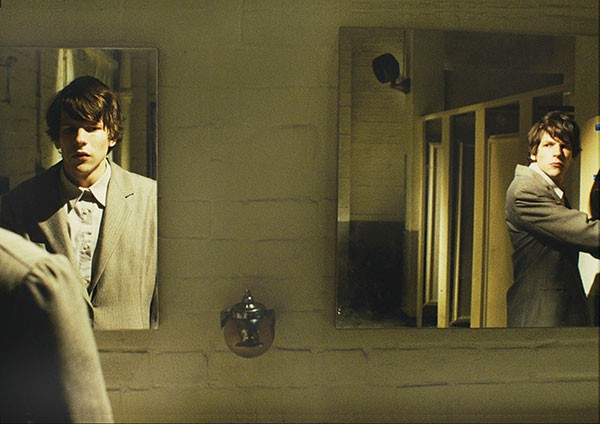A man enters a subway train, and tells its sole occupant: "You're in my place." That the seated man moves tells us much about Simon James, the protagonist of Richard Ayoade's The Double. Simon (Jesse Eisenberg) is meek and easily cowed, even in the face of an outrageous demand.
Arriving at his workplace — a cluster of dark, Victorian-like cubbies filled with gloomy scribes — Simon is further harassed by the other employees, and thwarted in his pathetic attempts to make contact with a young woman, Hannah (Mia Wasikowska). At night he watches Hannah, who also seems lonely and lives in the building across the street, through a telescope. It's as if Simon barely exists, and might as well join the legion of suicides that occur in his neighborhood.
Then a new employee shows up at work. His name is James Simon, and he looks identical to Simon. But James (also played by Eisenberg) is everything Simon is not: funny, persuasive, assertive. Initially, Simon befriends James, as the more socially powerful man coaches Simon to take charge; James even subs for Simon on a date with Hannah, allowing the shyer man to woo Hannah by proxy.
But James comes to dominate the bifurcated Simon/James, creating confusion, frustration and, eventually, anger for Simon. His life wasn't much before, but now that it's being usurped by James, ironically, it's become worth fighting for.
Ayoade's dark comedy is based on a 19th-century novella by Fyodor Dostoyevsky, and it's as much about the philosophical pursuit of self as it is an absurdist exercise. Does Simon have a doppelganger? Or are the competing halves of his self temporarily operating independently? Maybe he's simply going mad. (See also, Fight Club.)
Filmmakers love the imagery available with dual-nature themes, and Ayoade is no exception. The film opens with a close shot of Eisenberg's face, as light from the subway car he's riding flicks off and on; throughout The Double, we get mirrors, half-faces and characters positioned in opposite corners of the frame. Eisenberg does a fine job portraying the two identical men as separate entities, as their polar-opposite personalities allows for easily adjustable body language. (No disrespect to Eisenberg, but Tatiana Maslany, currently portraying nearly a dozen clones on TV's Orphan Black, has really raised the bar on "acting double.")
The Double has a broody Brazil vibe, offering a dystopic retro-future, where a life of lonely drudgery is enclosed by dark corners, brick walls and exposed pipes. It seems like the sort of depressing world where the livelier half of one's personality really might manifest itself into a separate being — just to stay sane.















